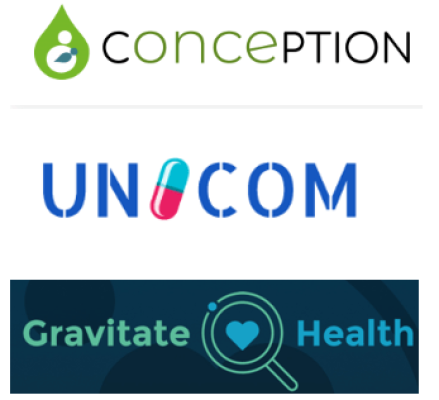During the annual I~HD conference organised in Ghent (Belgium) on November 30, a workshop has been organised with the participation of three important projects: UNICOM and two IMI (Innovative Medecine Initiative) projects: Gravitate-Health and ConcePTION. The Gravitate Lens (G-Lens), focuses on approved electronic product information (ePI) content, and offers a route for patients to access trustworthy, up-to-date information that better meet their individual needs. ConcePTION aims to establish a trusted ecosystem that can efficiently, systematically, and in an ethically responsible manner, generate and disseminate reliable evidence-based information regarding effects of medications used during pregnancy and breastfeeding to women and their healthcare providers.
After the presentations of the 3 EU projects, the audience split up in three working groups to discuss for 30 minutes the potential for cooperation between the 3 projects. The three themes selected were: possible topics for cooperation, the potential role of AI and the joined steps to be taken to ensure sustainability of the results of the 3 individual projects.
1. Possible topics for cooperation
Both Conception and Gravitate-Health can be considered as examples of European Expert centres. Linking their information to IDMP-compliant drug dictionaries will make their deployment in the 27 member states technically feasible and seamless. It is important that not only patients and prescriptions cross the borders, but also the evidence-based information sources need to be able to connect to medicinal product dictionaries in the different member states of Europe and in countries beyond Europe. In Europe, there are several world-class centres of expertise (pregnancy information, structured Product Information, computable guidelines, drug interactions) who could profit from this by being able to adress larger multilingual markets.
Both projects need to group information on “similar” medicines and can benefit from the equivalence modules developed in UNICOM to sustain crossborder implementation of national substitution rules. For Gravitate-Health, this would enable to access existing translations of ePIs from different countries, leading to interesting functionalities for the users of the information.
Full IDMP implementation will take time, and is a long and labour-intensive process. Projects such as UNICOM, Gravitate-Health and Conception can coordinate the prioritisation of the substances. Currently, there is a minimal data set of 4 substances which allows the 3 projects to set up pilots and demos. Extension to larger data sets should be coordinated.
It was also argued that the inclusion of IDMP in the big data pharmaco-epidemiological networks would enable new designs with virtual arms for the controlled study of outcomes of exposure to medicinal products in pregnant women.
2. Potential Role of AI
Each of the projects has already envisioned the potential use of AI: Conception experiments with Natural Language Processing (NLP) in support of knowledge discovery and text mining from the literature, to facilitate and optimise the cumbersome work of knowledge extraction from the scientific literature. Gravitate-Health considers to use AI to automate the translation of national language versions of ePI content. Also the extraction of Meddra Terms from the Summary of product characteristics (SmPC) could be considered, as well as the automatic coding of indications and contra-indications.
In addition to the extra structuration of PDF versions of the SmPC (and User leaflet), IDMP elements could be identified and encoded in the texts. UNICOM may also consider the use of AI to facilitate extraction of IDMP coded data from the SmPCs.
AI experiments in the 3 projects could benefit from combined effort in exploiting the huge collections of SmPCs and User Leaflets as “training sets” for custom made AI programmes. The suggestion is thus to use AI and train with own data, instead of using general language models or resources from translation companies (who already use a lot of AI tools themselves). This is also important for AI programmes that transform professional texts (such as SmPCs, but also discharge letters) into lay-understandable communication, and to adaptation of national languages to local languages (or dialects).
As validation of these tools is key for quality assurance in the AI approach, the efforts for validation could be a common endeavor.
3. Joined steps to be taken to ensure sustainability of the results of the 3 individual projects
All three projects will need connections with external reliable sources of “evidence-based” information, either to help in the production of basic information or in further referencing links to external sources in their own information offer. More guidance / “criteria” for what would constitute a trusted source – be it available already or to be created.
Robust and advanced interoperability standards should be an area of joint effort, as this is important to evolve to connect various information resources. Gravitate-Health use a few FHIR resources, as do important other entities such as EMA and FDA. It is to be noted that the EU ePI common standard was the starting point for the FHIR ePI Implementation Guide for global use.
Sustainability is an important issue for all 3 projects: Unicom is assuring open source tooling in a T6.6 software factory and testing environment, including also tools and resources from the minimal data set and from the FHIR and IHE communities.
It can be anticipated that ISO IDMP would serve as “cross-reference” for medicinal products / same or equivalent active ingredient and ePI (PIL – SmPC) cross-border / cross-constitutency use of language and modality of choice.
To “connect the dots” the subset of ISO IDMP compliant samples of medicinal products (Mimimal data set for 4 substances in 5 to 10 countries, could be an intermediate solution for testing, preparing pilots, that alow to be prepared for the endgame / goal (Full IDMP implementation, and seamless integration of ecosystems.
UNICOM very much welcome the results of this worskhop which constitute an important incentive to actively seek direct collaboration with current and future projects which can profit of UNICOM results.


